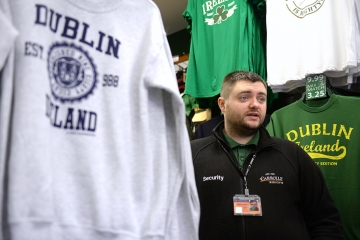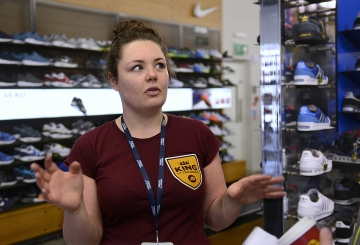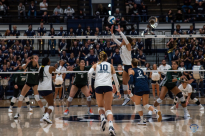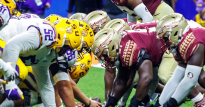Complicated and slow: Dubliners give their take on American football
DUBLIN – Even in the sporting goods stores, the lack of interest is apparent.
 If you’re looking for American football gear, there’s just one display behind the counter. And, well, that’s about it.
If you’re looking for American football gear, there’s just one display behind the counter. And, well, that’s about it.
“I’ve been here for three years, and nobody has asked me for American footballs,” said Matthew Owen, a salesman at Lifestyle Sports in Dublin. The 20-year-old college student from Sutton said he didn’t even know about the game between Penn State and Central Florida until a controversy arose about the semifinals of the national Gaelic football tournament being moved from Croke Park to Limerick.
Croke Park, the crown jewel of the Gaelic Athletic Association, will play host to an American football game for just the second time since ground was broken on the stadium in 1884.
Just one slight problem: the Irish don’t seem to care about American football. To borrow an expression from the Emerald Isle, the excitement for the game is “as scarce as hen's teeth.”
“It has fans, but it’s much more of ‘niche’ sport,” says Shena Boyle, who works at Eason’s Bookstore in Dublin. “We have our own football.”
Lining the shelves of the shop’s sport section, there are volumes upon volumes of historical texts about Gaelic football, biographies of legendary soccer and rugby players, and comprehensive guides about uniquely Irish sports such as hurling, handball and rounders. There were even six or seven books about professional wrestling, and a couple more about fishing and hunting. The one sport that was missing? American football.
“We do have one copy,” said Boyle with a wry smile. “‘Friday Night Lights.’”
Boyle pointed to minimal TV exposure as a possible reason for the sport’s lack of interest. Even for fans who want to see the action, they need to pay a subscription to a premium sports channel like SkySports or British Eurosport, packages that are outside the price range of the average Irish fan.
 “Yes, it’s really quite expensive,” said Dublin native Aisling McGing. “They don’t have it on free TV, and the times are quite awkward here.”
“Yes, it’s really quite expensive,” said Dublin native Aisling McGing. “They don’t have it on free TV, and the times are quite awkward here.”
Another drawback is the perceived difficulty of the game, and how hard it is for the casual observer to grasp the concepts and tactics. Jasper Pickers, a mechanical engineering student at Trinity College in Dublin, said he and his friends enjoy playing an occasional game of Madden, but even after a few hours with the popular American football video game, the tactics are still about as foreign to them as blood pudding is to us.
“We prefer to see the rugby players smashing together,” joked Pickers, adding the American game is “a bit slow.”
Gaelic games like hurling and football are much easier to learn compared to the NFL, with a rule book that requires a whopping 121 pages to explain 17 rules.
“It’s very simple to pick up most of the games we have,” said Chris Burns, a salesman at an Irish merchandise store located on O’Connell Street in Dublin. “It’s like grab the ball, kick the ball, get it to a certain area in the place. There’s no stoppage in play unless it’s something serious.”
Burns himself is an American football fan, thanks to his American relatives. He and his fiancée watch a few games with their friends, but said they’re in the minority. He mentioned the time difference as a reason why some Irish don’t follow the sport, but said the main reason is the lack of promotion.
“You don’t see ads,” said Burns. “Everywhere you go coming up to the weekend, you’ll see a billboard: ‘Liverpool vs. Manchester City’. That’s an English sport. No promotion for American football. You don’t see it on TV here. You don’t hear about it. Especially the college games.”
A Dubliner for all 25 years of his life, Burns says there was a time when it was “cool to follow a team in America,” almost like an underground cult. But that was during the late 1980’s and early ‘90’s.
While the majority of Dubliners don’t have any interest in the sport, there are still those that do. In fact, Ireland boasts its own American football governing body: the Ireland Amateur Football Association, or IAFA. Along with flag football, there is the IAFL, an adult, full contact American football league using NCAA rules.
Arun Mooney, a quarterback for the West Dublin Rhinos, one of 10 teams in the Shamrock Bowl Conference, said he’s seen the game grow in popularity since he was a kid.
“Every year, it’s getting bigger and bigger, especially with the Wembley games that are over there now, there’s a lot more fans,” said Mooney, referring to the annual professional football games in Wembley Stadium in London as part of the NFL International Series. “All this kind of stuff is really good for the sport.”
A fan of the New England Patriots, Mooney was out in front of Croke Park on Saturday before a semifinal match of the All-Ireland Gaelic Football Championship. He, along with other players from the IAFL, was helping to promote the game between Penn State and UCF. Fans could come up to the booth and take picture with helmets and jerseys representing the Knights and the Nittany Lions.
“Over here when I was 14, 15 and throwing a football around, people looked at me and said, ‘Why are you playing that? That’s a weird shaped rock,’” said Mooney. “But you walk into a sports store now, and you see footballs – at least one – but it’s good, though.”
(C.J. Doon is a student in the John Curley Center for Sports Journalism at Penn State. Fellow student Greg Pickel contributed to this report.)







